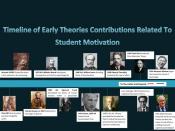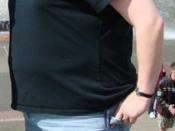�PAGE � �PAGE �1� Motivation and Reinforcement
Running head: Motivation and Reinforcement
Motivation and Reinforcement on Performance
Kimball K. Yamasaki
Virginia Military Institute
Abstract
A simple game was given to volunteer cadets at the Virginia Military Institute (VMI). In order to measure motivation, half were offered more incentives if they produced a certain high, but obtainable, score. Results indicate that offering extra incentives for a reaching a higher, more difficult, score did play a large part in the performance of the cadets in this game. The group with incentives had a mean score that was 45% higher than the group without incentives. The results are interpreted in the context of the motivation and incentives theory, as well as the reinforcement theory (drive reduction theory).
Motivation and Reinforcement
Motivation plays a large part in our behavior. In psychology, motivation refers to the initiation, direction, intensity and persistence of behavior (Atkinson 1965).
Motivation is having the desire and willingness to do something. The theories of motivation address multiple issues of behavior. The majority focuses on learning and drive reductions or the need to reduce motivational needs. The Motivational theory comes in many forms (Peters 1965).
In the behavioral side of motivation Pavlov would state that biological responses to associated stimuli energizes and directs behavior under classical conditioning. Operant learning states the primary factor is consequences: the application of reinforcers provides incentives to increase behavior; the application of punishers provides disincentives that result in a decrease in behavior (Tapp 1969). In the aspect of this study, operant conditioning plays more of a role because of the application of reinforcers or incentives.
The cognitive view of motivation focuses on the cognitive dissonance theory. This is similar to disequilibrium in Piaget's theory of cognitive development. This theory was developed by Leon Festinger (1957) and states...


